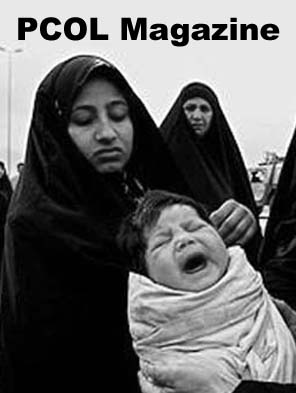
The idea of American "exceptionalism" spawned the Peace Corps, moved mountains of food aid and promoted the spread of human rights but it also led us into the swamps of Vietnam, the jungles of Central America, the deserts of Iraq
VIEWPOINT: Bad apples? No, fruits of America at war
By Michael Massing
LOS ANGELES - "A few bad apples" is Washington's message to the rest of the world in trying to explain the appalling images out of Abu Ghraib prison. But the rest of the world is not having it. From Paris to Riyadh to New Delhi, commentators are insisting that these acts are not exceptions but part of a pattern of American arrogance and brutishness.
"The torture is not the work of a few American soldiers," a columnist in the London-based Al-Quds Al-Arabi newspaper wrote. "It is the result of an official American culture that deliberately insults and humiliates Muslims." Over and over, American acts in Iraq have been equated with those of Saddam Hussein - a comparison Americans find absurd.
How to explain this discrepancy? Is the rest of the world deluded, or are we? Have others been propagandized, or have we? The Bush administration and its backers have frequently pointed the finger at Arab satellite networks such as Al-Jazeera, charging them with casting all U.S. actions in the worst possible light. Any fair-minded viewer of these networks would have to acknowledge the merit in these complaints. Although resourceful and enterprising, these networks appeal to an Arab nationalism and pride that views the U.S. occupation as inherently illegitimate, and their broadcasts reflect this. Hour upon hour, they beam images of U.S. soldiers ransacking homes; of men and boys being marched off in handcuffs; of hospital beds full of children missing limbs, eyes and hope. So when photos of Americans abusing Iraqi prisoners are released, they're seen as part of a pattern.
But Americans have been fed their own highly skewed version of reality. It's rooted in the idea of American "exceptionalism," of our unique mission to inspire and transform the world. This vision goes back to Abraham Lincoln, who spoke of the United States as the "last best hope of Earth." John F. Kennedy urged us to "pay any price, bear any burden, meet any hardship" to promote liberty. And George W. Bush has repeatedly proclaimed his belief that the United States has "an obligation to unleash freedom in the world," as he put it in a recent speech.
Such rhetoric can have benevolent results. It has spawned the Peace Corps, moved mountains of food aid and promoted the spread of human rights.
But such talk can also be dangerous. It has led us into the swamps of Vietnam, the jungles of Central America, the deserts of Iraq. Mesmerized by our idealism, we have averted our gaze from war's realities - the razed villages, the death squads, the barbarities of occupation.
During the war itself, while Arab and European news organizations unflinchingly presented images of the dead and injured, the American networks - worried, as always, about viewer sensibilities - scrubbed their broadcasts of all signs of blood. The decision of some newspapers to publish photos of flag-draped coffins caused an uproar. So did Ted Koppel's decision to read the names of the fallen on "Nightline." When the Sinclair Broadcast Group announced that its stations would not air the program, it fell to war-hardened veteran Sen. John McCain to note the need for the public "to be reminded of war's terrible costs, in all their heartbreaking detail."
At least U.S. casualties are finally getting some attention. Iraqi casualties are not. The U.S. military does not track them, and U.S. news organizations rarely report on them. The recent fighting in Fallujah is a good example. After four American security contractors were killed and their bodies mutilated, the U.S. military pounded the city with warplanes and gunships. By most accounts, hundreds of people died, many of them civilians.
Al-Jazeera showed nonstop footage of these victims, searing them into the Arab psyche. On American TV, they were barely a blip, and, two weeks later, we still have no idea how many civilians died. And we don't seem to care.
The photos out of Abu Ghraib have finally pierced the screen of our complacency and self-regard. They have forced us to confront the fact that war brutalizes - and not only the vanquished. The guards who shackled and stripped the Iraqi prisoners may be bad apples, but they are the predictable fruit of an expanding American imperium. We must recognize that those smirking grins and sadistic leers are not simply expressions of some alien breed - they are the face of America at war.
Massing is a contributing editor of the Columbia Journalism Review and a frequent contributor to the New York Review of Books.
